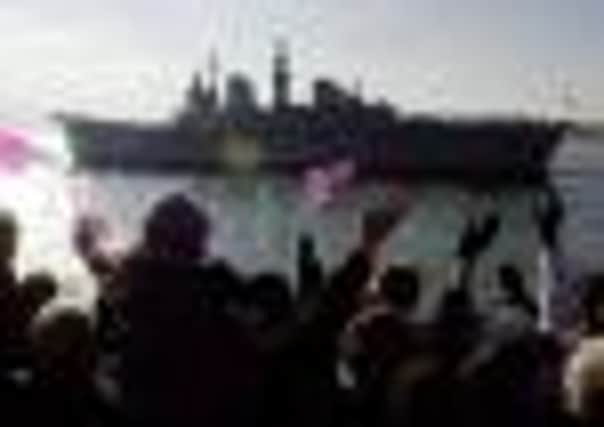Eric Grove: In an uncertain world, we can’t afford to throw away Britain’s naval strength


Aircraft carriers provide mobile, ready, sovereign air bases that can be rapidly brought to bear without reference to any other power.
They can poise (to use the British doctrinal term) in international waters giving politicians a range of options, with a capability for rapid action once they make their minds up. If nationals have to be evacuated, helicopters can be based aboard to carry out the mission. If opposition is expected, it can be overawed or, if necessary, neutralised by combat aircraft totally free of the limitations of doubtful host nation support.
Advertisement
Hide AdAdvertisement
Hide AdUntil the end of last year, British politicians had this option. Although the capability was not on the same scale as that of the Americans, the British Carrier Strike Group – coupled with the Littoral Manoeuvre Group – gave the UK the necessary capability to cope with the unexpected.
Now there is only the latter, devoid of vital organic air support, because of the extraordinary decision in the so-called Strategic Defence and Security Review to scrap the Harrier force and HMS Ark Royal.
I was one of a group of concerned academics and retired senior officers who recently wrote to Downing Street, calling for a reconsideration of policy. This was meant to be private correspondence but, perhaps inevitably, the letter was leaked to the media (we do not know by whom) and it made the headlines last Friday. One can now spread the arguments of the paper more widely.
In the absence of carrier strike, the United Kingdom can now no longer engage in expeditionary operations in support of nationals and vital interests. This strikes at the heart of everything Britain has been trying to achieve in defence since the end of the Cold War. Although a reduced Littoral Manoeuvre Group has been retained, it cannot operate even against lightly-armed opposition without considerable risk.
Advertisement
Hide AdAdvertisement
Hide AdThe architects of the Review claimed that the future was so predictable that we would not require a carrier strike capability until it was reconstituted (a challenging task) in 2020.
In October 2010, the Middle East was full of friendly states with stable authoritarian regimes who might well give host nation support to land-based aircraft.
Within a few months, that assumption has proved to be fundamentally flawed. The Middle East is now in turmoil with British citizens in danger and serious uncertainties over future international relationships, including basing rights.
One wonders if Ministers have been regretting their hasty decisions of last autumn. In the event, HMS Cumberland was available to put into Benghazi for an evacuation operation from Libya – although ironically this was one of the four frigates slated for premature disposal in the SDSR.
Advertisement
Hide AdAdvertisement
Hide AdThe RAF was able to fly in Hercules transport planes to save British nationals marooned in the desert, but both these operations depended on a relatively benign environment more or less under the control of friendly, anti-Gaddafi elements. It was also noteworthy how different was the atmosphere of the well-controlled maritime evacuation at Benghazi compared to the chaos at Tripoli Airport.
The basic point is that the future is inherently uncertain; the only certainty is uncertainty and one rejects this fundamental truth at one’s peril. The Labour Government specifically stated that Britain needed a carrier capability in order to cope with these future challenges. In no way were the new carriers relics of Cold War thinking, as some have argued.
The decision to scrap the Harrier, as I have previously argued in these columns, was only arrived at as a result of special pleadings.
It seems that the Treasury belatedly revised their sums in what has proved to be an over-optimistic upward direction and Ministers were beguiled with the prospect of a larger fast jet striking force that could continue to make a contribution in Afghanistan, rather than a front line of a mere 18 Harriers.
Advertisement
Hide AdAdvertisement
Hide AdNo time was provided to go into all the issues in sufficient depth, notably the loss of a key maritime capability. It might have been argued that carrier basing and the increased leverage it offers made up for apparent deficiencies in sheer numbers.
This was not just an RAF decision about aircraft. It was one that has decisively hobbled the capability of the UK to exert the maritime power it needs given its interests and responsibilities.
In my book The Future of Sea Power, I came up with a categorisation of navies that has seemed to command general approval.
In this, I put Britain and France in category three “Medium Global Force Projection Navies”. The qualifications were nuclear-powered submarines, amphibious capabilities and carriers. Now the Royal Navy is teetering on the brink of demotion, with India and China on the way up.
Advertisement
Hide AdAdvertisement
Hide AdAnd all this to maintain an obsolescent Tornado force that it now seems is to be run down rapidly after all. The Harriers reportedly have not yet been scrapped. Ark Royal can be recommissioned. Is it really too late?
Eric Grove is Professor of Naval History and Director of the Centre for International Security and War Studies at the University of Salford.